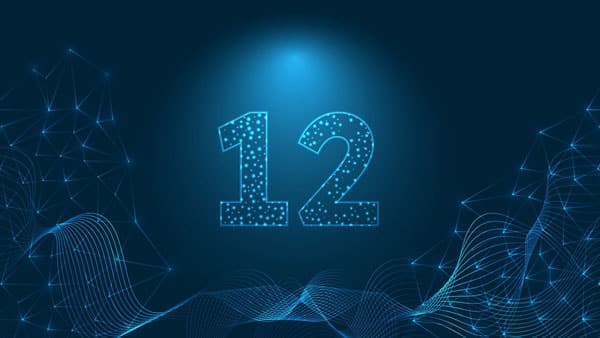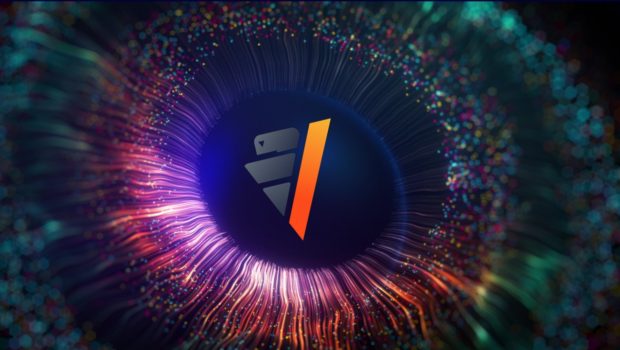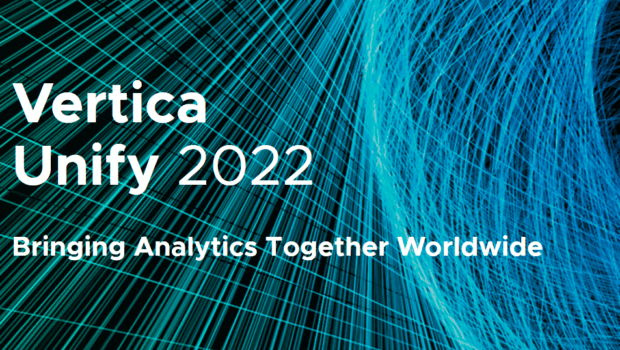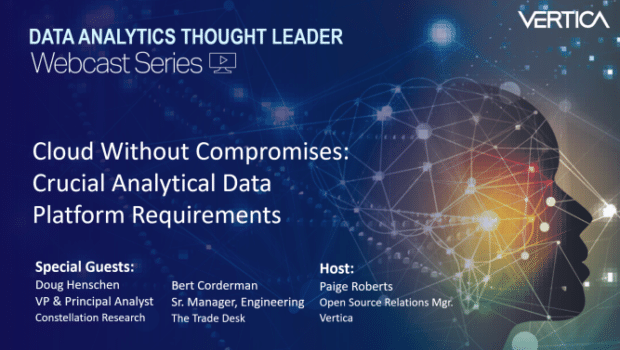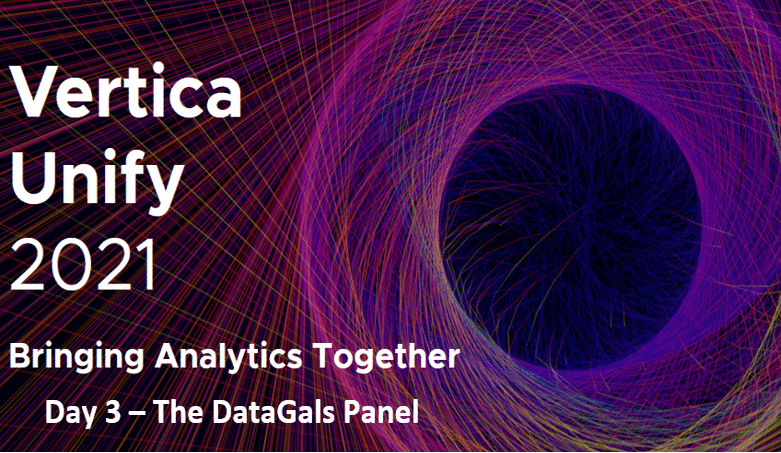
Representing five different time zones, and committed to sharing their thoughts and guidance based on the success they’ve achieved in their careers, five women gathered live and online Thursday, July 22 to discuss their experiences in high tech. Here’s how they appeared in this virtual panel discussion:
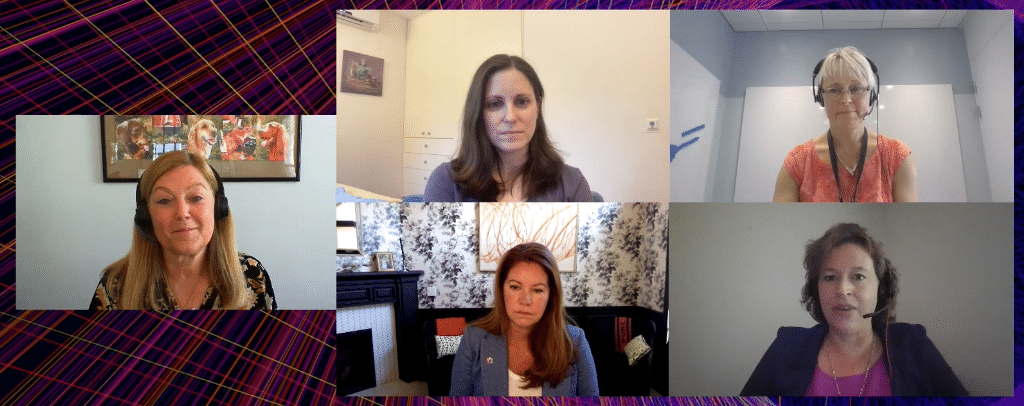
Far left: Joy King, VP of Product and Go to Market Strategy at Vertica, and host of the DataGals panel, North Carolina. Top row: Keren Bartal: Director of Data Engineering for Taboola, Israel, and Elina Tuominen: Service Manager for Elisa Oyj, Finland. Bottom row: Amy Fowler, VP of Strategy & Solutions for Pure Storage, Oregon, and Theresa Melvin: Chief Data Scientist for Vertica Americas, Missouri.
What follows is based on the DataGals Panel discussion, the final presentation at Vertica Unify 2021. Find the full on-demand presentation on the Vertica Unify 2021 event site; see instructions below.
Joy: My first question is, What are some of the biggest challenges you’ve faced in your career path, specific to your gender? I would like to open our discussion with my own answer to this question. Not all of our challenges are related to gender, but some of them are. In my case, I started in a technical sales role, with Digital Equipment Corporation, or DEC. My manager told me that the buyers I’d be engaging with were men, “and I’m worried that they won’t take you seriously, that they won’t believe you could have the knowledge they need to make informed decisions.”
He told me straight out that it was because I was a girl. I don’t think he meant to be disrespectful, but was simply saying what he truly believed. For me, this became a challenge. I was determined to prove him wrong. Which meant I had to spend a lot of time learning – all the acronyms, all the technical phrases, and courtesy of Digital I spent six weeks at MIT learning computer science. And in the end, I was able to prove him wrong. I became a top sales performer at Digital, selling to the men who trusted me enough to buy a lot of VMS powered machines in those days. Amy, I’d like to hear your story, because you’re in a similar space at Pure Storage.
Amy: I started out at EMC, which is now part of Dell, and this company today is really dedicated to ensuring women have the same opportunities as men. But the kind of conversations you’re describing could have happened much earlier in my career. Today this is not top of mind for me. Most of [the women I work with] feel a need to be better, in order to be considered on par, and for me, that’s actually very motivating. In the past ten years, I’ve had children, and the biggest challenge ends up being the day-to-day additional work outside the workplace. At least in the US, there is still a significant imbalance, even if you have a partner, like I do, who is very committed to co-parenting and helping with the laundry.
But studies show that women still spend many more hours a week on children’s activities, making sure they get where they need to go, that there are groceries in the refrigerator. The amount of total hours it takes for me to do both my jobs simply adds up to more than my male colleagues. Keeping up with the competitive and challenging nature of my career consumes many more hours a week.
Joy: That’s right, you can take that double burden and make it hard, or you can make it a challenge, telling yourself “I will do this.” There are different challenges in different cultures and countries. Keren, what are your experiences in Israel?
Keren: I admire both Joy and Amy for talking about these challenges, and I can relate to both of them. I think there are a number of role models for women, and I recently heard a saying: “If you can’t see it, you can’t be it.” Which is a big reason why this panel is so important. Not seeing female role modes is problematic. Women and men respond to the same situation differently, and they are perceived differently. And while they want to achieve the same thing as men, they may go about it a bit differently. While I’ve had a lot of great role models, not enough of them were women. It’s not just about having women in senior leadership at your company. You need to find a woman in your organization you can relate to, who can be your mentor.
Joy: That’s an important point. There are many companies who say “Look, we have a woman on the senior leadership team. We have a woman on the board.” But that’s not enough. We need to have a personality we can relate to, which means more than one. Theresa is a well-known contributor in the open source community and in the machine learning space, but I was horrified to learn that the code women produce is scrutinized at a much higher level that the code written by their male colleagues.
Theresa: I have to tell a personal story. I started consulting once I had the technical prowess to do that. You don’t know anything when you get out of college. For instance, colleges teach R, which is a tremendously powerful language. But industry uses Python. You still want to be a consultant, to fly over the world, not be tied to a desk. That was my goal when I was young. When I finally developed the skills to consult, I would walk into a room full of men, and everyone would do a double take. I’d spend the first two to three days of a five-day contract just proving that I could do the job. Those days were wasted. One contract was for several months, and I got really acquainted with the team. When I told them my frustrations about wasting time just proving myself, they told me “Well, frankly, we don’t see many consultant who look like you.” That was honest, and I wasn’t offended. They’re dealing with all men, so when a women walks in they don’t know if she can do what she says she can do. It took a long time, but I learned that the less people knew about my gender, the better off I was professionally.
Now, I maintain very tight control over my privacy. You won’t find anything about me if you go looking; there’s no code with my name on it, for instance. Even 25 years later, gender is still first. This is unfortunate, for women in the STEM field (science, tech, engineering, and math). We start out strong. Right out of college, I see lots of faces that look like mine in the office. But as we get older, there are fewer and fewer of us out there. As more of my peers left to have families, they either did not return, or when they did it was to completely different roles – ones that were less demanding.
Joy: Elina, you’ve mentioned that gender actually has some advantages in Finland. Can you explain?
Elina: I think in Finland the biggest advantage is related to maternity, because we generally get a year at full salary, and the second year with many good social security benefits. So you can stay with your kids at home for quite a long time. Of course, if you’re a long time away from the office, you need to find a way to update your skills, and as we know the technology field is changing rapidly.
As for gender, only 20% of the staff in my office are women. I’ve always worked mainly with men, in a role that has always been more or less technical. When I’ve worked with the guys, they don’t care whether you wear makeup, or a funny shirt. So I can be myself while working with them. In fact, I think that, as a team leader, my team opens up more about their personal life to me than if I were a man. On the other hand, when I hear some negative comments about my physical appearance, I wonder if they’d say the same things to a man. Probably not.
Joy: Here’s a question from the audience that we all might have expected, and I’m going to start with you, Keren. How do you feel about doing sessions on women in tech? Do they energize you, or do they make you angry or embarrassed?
Keren: To be honest, I’d much rather talk about technology than my experience as a woman in the field, but I do see the value in these sessions. And I’m proud to be here, so there’s that.
Amy: I agree with Keren. It would be great if this were not a necessary topic. Earlier in my career, I would have tended to put this to the side, just get the job done and not talk about this so much. But now I see how important it is for those of us who have the platform, those who have gone through to the more senior levels, to make sure we’re not just looking at this neutrally, but to pay closer attention to that “you can’t be what you can’t see” notion. I’m very glad we’re doing this, even though I wish we didn’t have to.
For the complete recording of Thursday’s DataGals Panel at Vertica Unify 2021, sign in to the event with your ID and password, go to “agenda,” and select “July 22” at the top of the page. Scroll down to “DataGals Panel,” and click the event. And if you didn’t register for Unify, it’s not too late! Just register here, and you’ll have all of the recorded sessions, breakouts, including DataGals available on demand.
“It’s genuinely an honor for me to host this panel, and I want to thank all the women” who participated in the July 22 discussion on the career experiences of these five data experts. – Joy King

